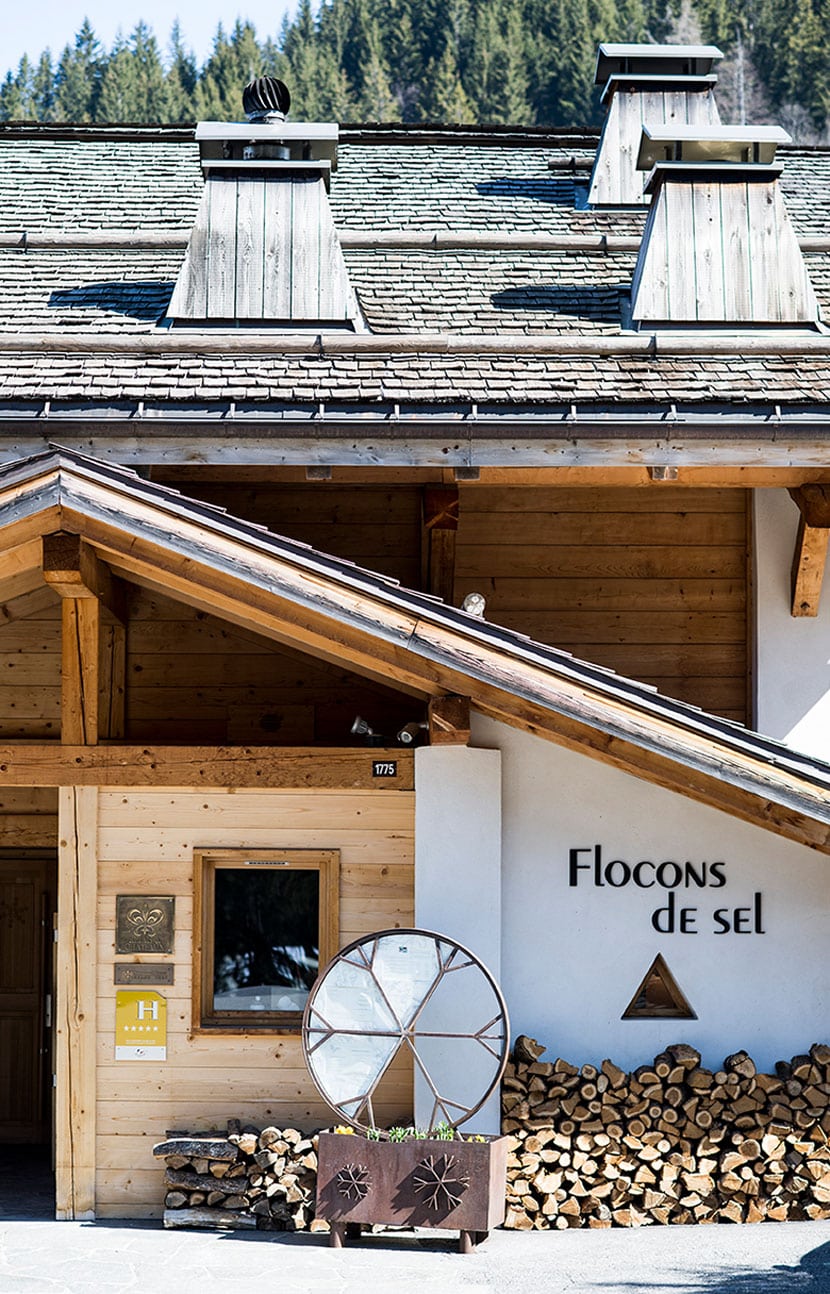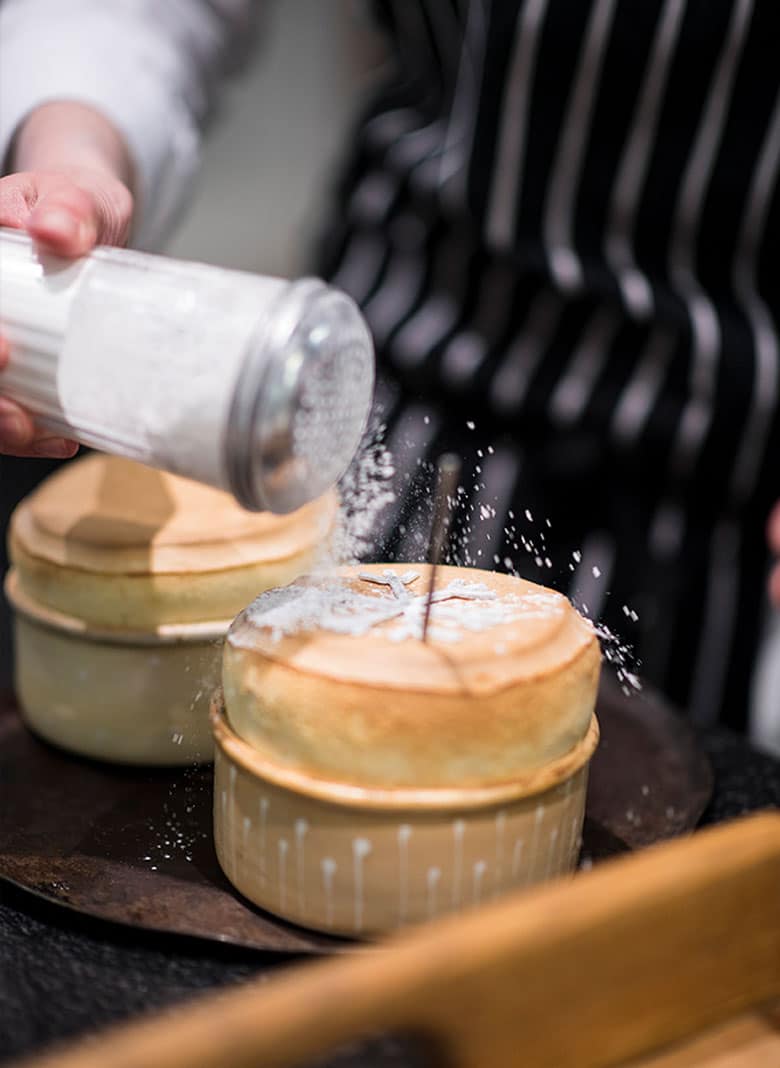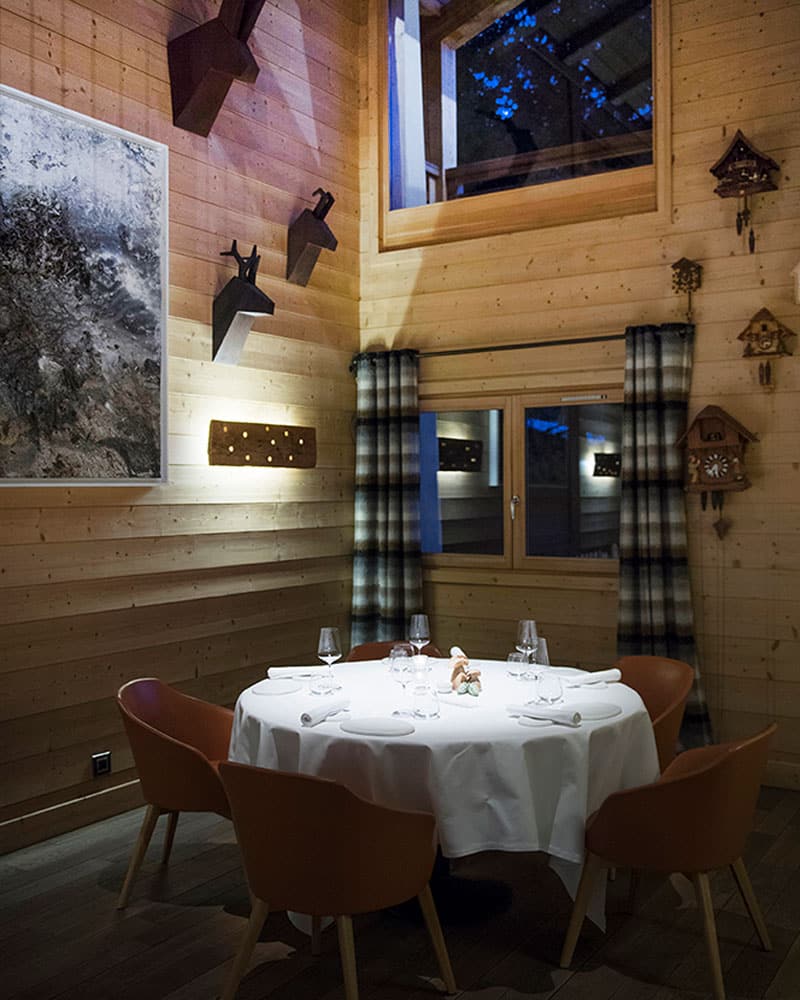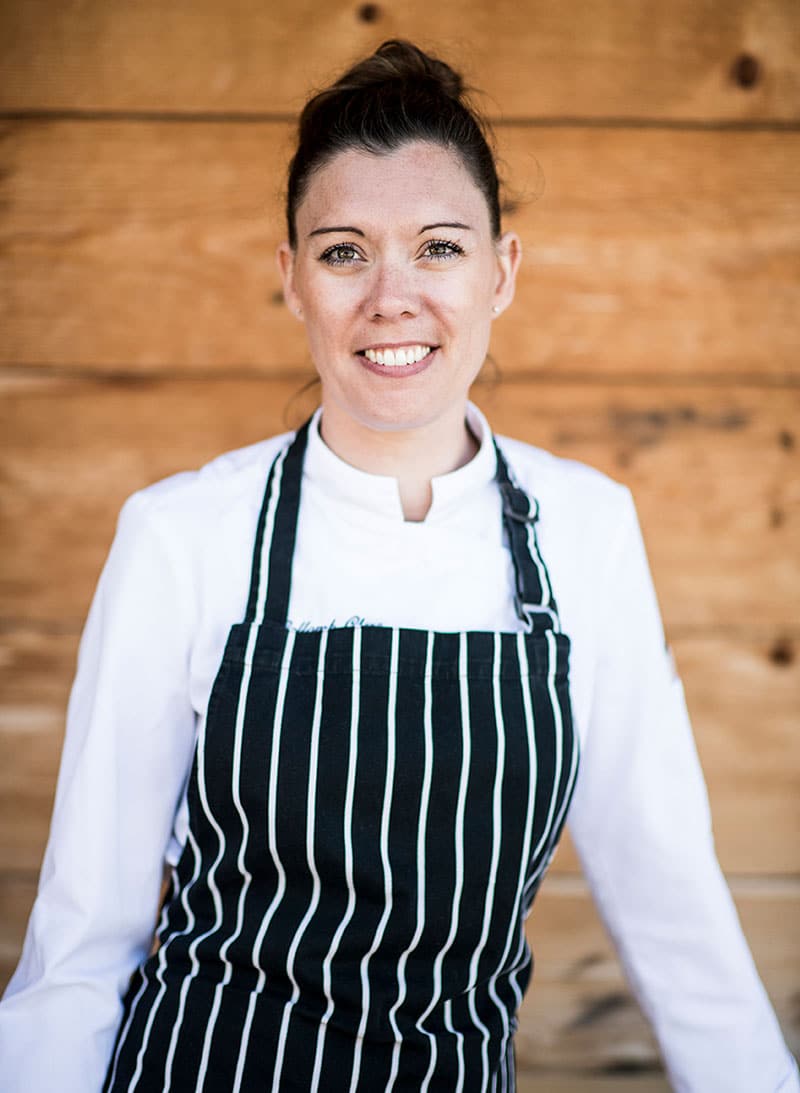Aurélie Collomb-Clerc
« I want to show women that this kind of career is completely achievable for them »
This year, Les Grandes Tables du Monde awarded her the Prize for Best Pastry Chef, which she accepted with her usual humility.
I started my studies in pastry making in 2009, at the apprentice training centre (CFA – centre de formation d’apprentis) in Groisy, Haute-Savoie. I did my apprenticeship in Bruno Bétemps’ baker’s, cake and chocolate shop: I got my vocational training (CAP – certificat d’aptitude professionnelle) in pastry and chocolate making, then I worked for a year in confectionery and chocolate making. Afterwards, I completed my training with an additional qualification in restaurant desserts at Château des Avenières, in Cruseilles (Haute-Savoie), alongside Pastry Chef Cédric Perret as well as a vocational diploma (BTM – brevet technique des métiers) in pastry making under Bruno Bétemps once more.
Afterwards, Chef Cédric Perret asked me to become his assistant pastry chef, so I returned to Château des Avenières. In 2015, I received coaching from Meilleur Ouvrier de France Thierry Froissard to prepare for Sirha Lyon’s French Championship of Pastry Arts (ice sculpture and ice cream desserts), where I won first prize. I then joined the Flocons de Sel teams in 2016, initially as chef de partie. Then, when the pastry chef position became available, Chef Emmanuel Renaut showed his trust and trialled me for a year. That’s how I ended up with the title of pastry chef.
Aurélie Collomb-Clerc en 7 dates clés :
- 2009: apprentice training centre (CFA) in Groisy and apprenticeship under Bruno Bétemps, first with a vocational training (CAP) in pastry and chocolate making, then in confectionery and chocolate making (Le Grand-Bornand, Haute Savoie)
- June 2013: additional qualification in restaurant desserts at Château des Avenières, (Cruseilles, Haute-Savoie), alongside Pastry Chef Cédric Perret
- June 2015: vocational diploma (BTM) in pastry making under Bruno Bétemps (Le Grand-Bornand, Haute Savoie)
- September 2015 to October 2016: assistant pastry chef to Cédric Perret at Château des Avenières (Cruseilles, Haute-Savoie)
- January 2015: first prize in Sirha Lyon’s French Championship of Pastry Arts in the ice cream category
- November 2016: chef de partie at Flocons de Sel (Megève, Haute-Savoie)
- 2017: pastry chef at Flocons de Sel (Megève, Haute-Savoie)

First of all, it’s a fantastic recognition. For my career of course, but also for Flocons de Sel and all the work we do there, our commitment, our values. We are lucky to work in such an amazing environment and it is our duty to preserve it. It is also a way of showing Chef Renaut that he was right to trust me!
How would you define your pastry making identity?
I make seasonal creations, which I modify slightly according to available produce. We have a lot of regulars who enjoy getting their favourites again and again. For instance, we have a soufflé that changes throughout the year. At the moment, it’s a fir tree soufflé with a lemon and orange blossom sorbet. And because the chef has just set up his own distillery, I’ll probably be adding homemade gentiane to the recipe very soon! Right now I use fir liqueur that gives a very sweet and resinous taste. I also make fir syrup, which I use as a condiment and also in some dishes. By macerating the fir buds in sugar, I obtain a texture similar to honey. It even has medicinal properties, especially for bronchial disorders. I am very interested in this link between taste and health benefits. In fact, I did my final year thesis on the virtues of mountain cooking. Of course, using these plants requires good knowledge of botany. I really like meadowsweet for instance. It was the precursor of aspirin. It treats many ailments such as joint pain and is recommended for blood circulation problems. But it can also be toxic if you boil it!
In autumn I also work with penny bun, which goes very well with the smoked chocolate tart.
At Flocons de Sel, we are lucky to be in a region that has many unique products to offer. But global warming is altering the seasonal rhythm of plants so we need to adapt as well.
We exchange ideas and then I do some research on my own. I also work a lot with my team so everyone can contribute their opinion.
I totally adhere to the chef’s cuisine and his values, so it was an obvious choice for me to come and work here. We both have a rather refined and sober style, and we love to work with the wild flowers and plants of our mountains, which we strive to preserve: we collaborate with local producers, and we have our own beehives and chickens. We pick plants sparingly and in such a way that they can keep growing. I think we show gratitude and respect towards our environment, and are careful not to take everything we find. With the chef, we share a philosophy of living in harmony with the mountain’s rhythm. We are rather isolated, in the heart of nature, and this is precisely what our guests look for when they come here. So they are completely in tune with our approach.
Who are the women who inspire you?
I admire Pastry Chef Claire Heitzler very much for her career. It’s not easy to reconcile work and private life when you are a pastry chef. Especially for her, as she belongs to the previous generation of women, when they were a lot less publicised and recognised than today.
The same goes for Christelle Brua. What an incredible career she’s had! She won the same prize as me a few years ago as well.


As a woman, I’ve always had to prove that I was legitimate in my position. When I first became a chef, I was managing mostly men. I had to prove myself, but I was determined and worked much harder to show that I belonged.
Despite obvious progress in recent years, our industry remains quite sexist. The fact that the chef trusts me has also helped me gain in legitimacy. But I still doubt and question myself all the time, it’s my way of moving forward. I always think I have something to prove.
There is a majority of women in pastry making. And yet, they rarely become chefs. This is because, once they reach a certain level, it becomes very difficult to reconcile their career with family life, which they also aspire to. At Flocons de Sel, we have several women in management positions. The chef makes this possible by being very open and wiling to adjust working hours when it’s necessary for some of us.
I have great respect for the women who deal with all this pressure, as they carry an extra mental load.
I manage five pastry chefs and we also have two bakers in the team. You must learn to adapt to your teams and to each individual profile, and I am very fortunate to be coached by a woman.
We still have many projects on the horizon with the chef. I am very demanding of myself, so I still want to improve and strive for perfection. I want to continue to help my team grow and give them more responsibility as well. At the moment, I am encouraging one of them to take part in the Pierre Hermé pastry competition, in the Chartreuse chocolate tart category. I received amazing support in my competitions, so now I want to return the favour.
This prize by Les Grandes Tables du Monde will allow me to continue promoting the values I hold dear, and I want to take advantage of this platform. I am involved with my apprentice training centre, where I am a jury member for the exams. I know how important it is for students to meet working professionals. Young people are our future and I want to show women that this kind of career is completely achievable for them. I try to inspire vocations, especially as there is a labour shortage at the moment. All too often, manual work does not receive as much recognition, but I have never felt so fulfilled!


